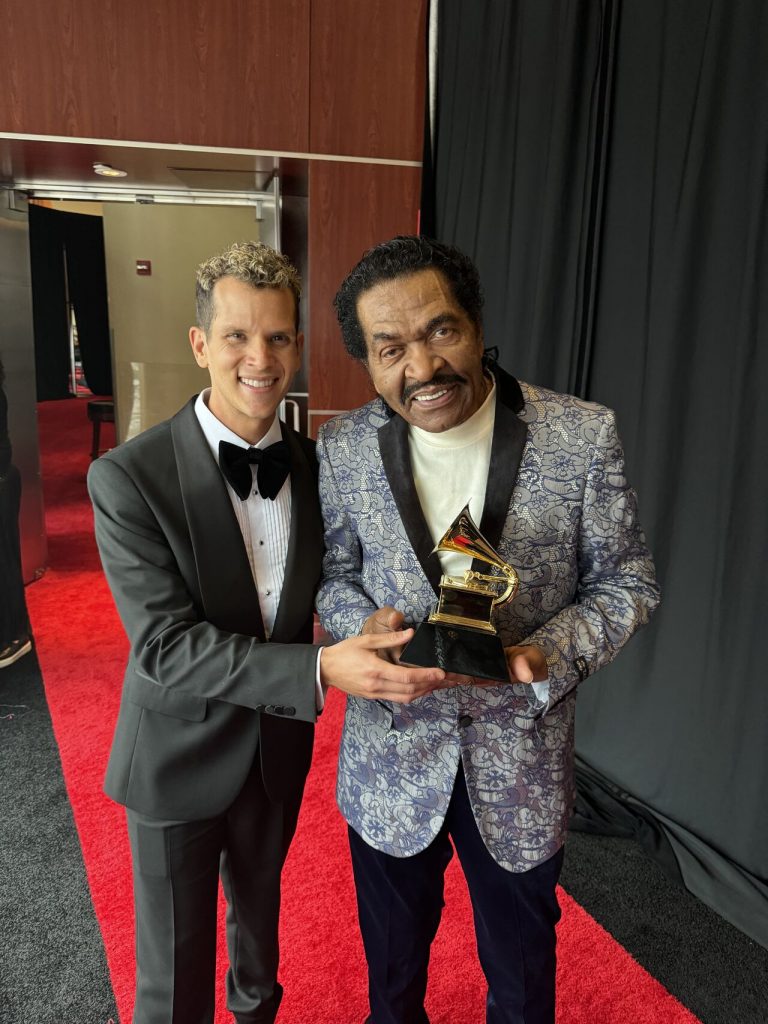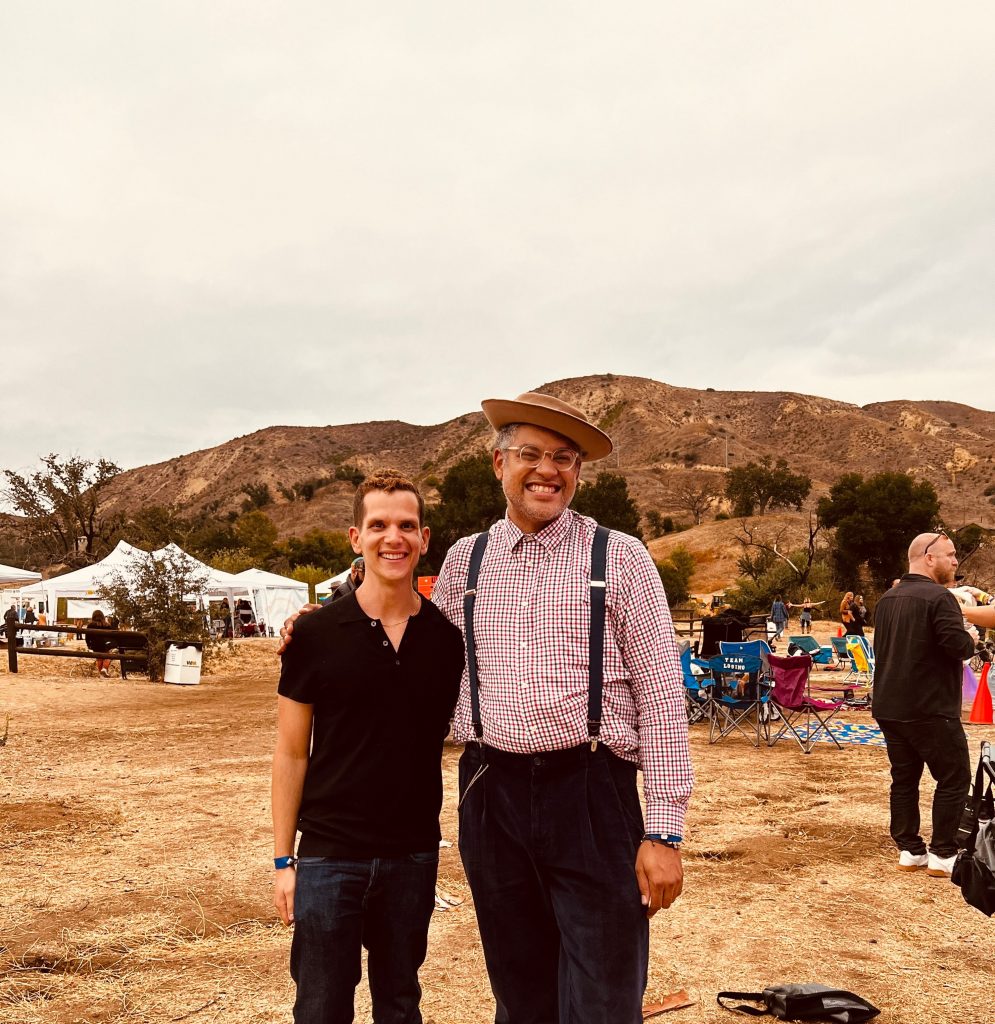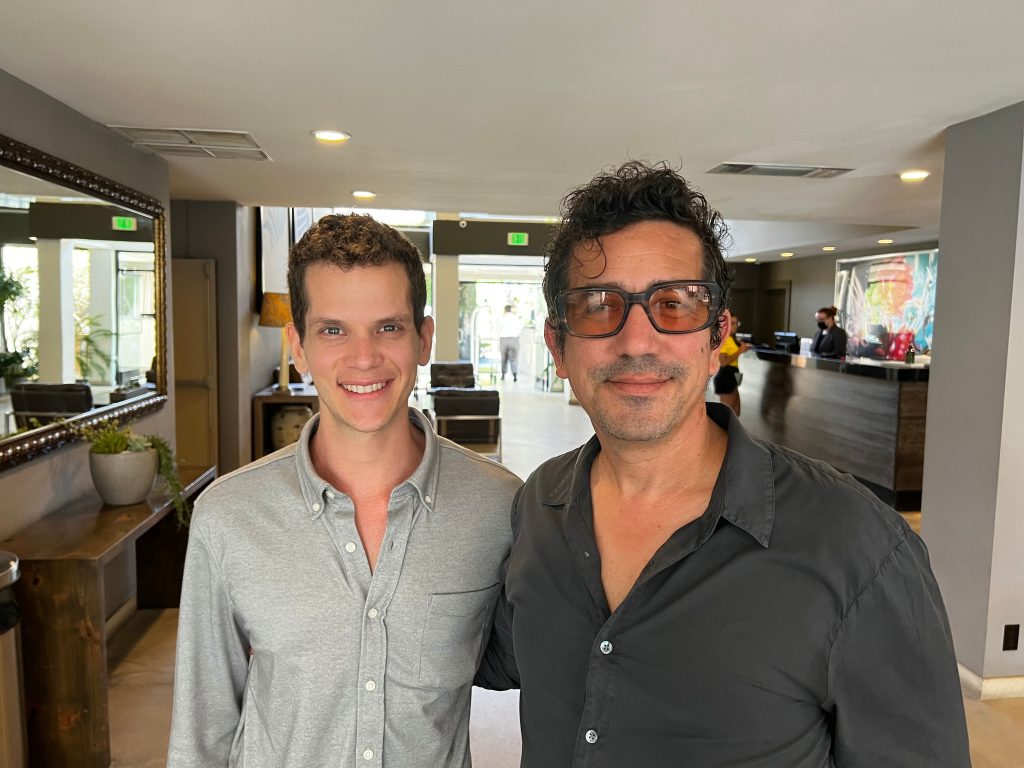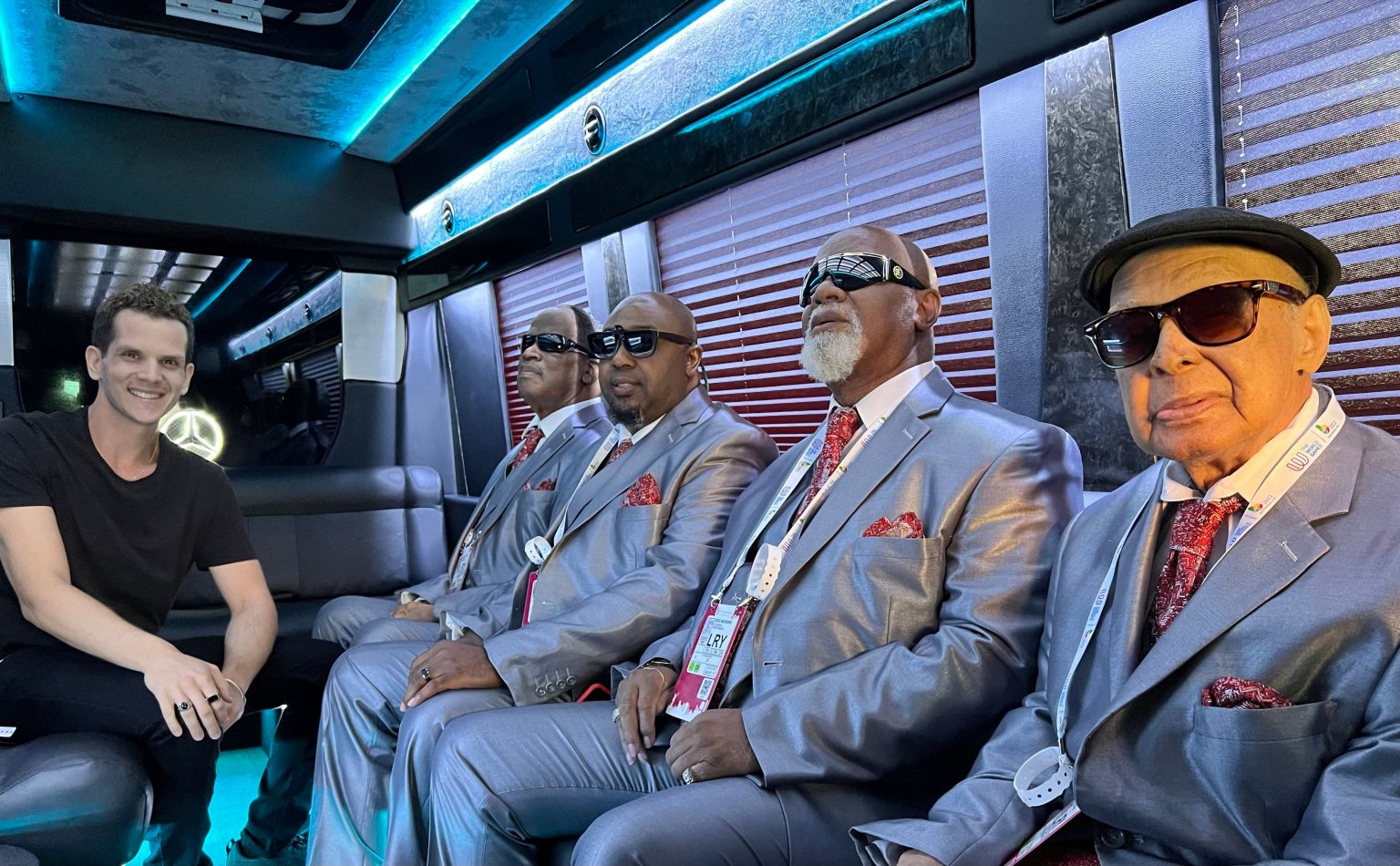“It’s been quite a journey,” says artist manager Jeff DeLia, reflecting on the 10-year anniversary of his Los Angeles-based 72 Music Management company. With a decade of success and an eclectic roster of in-demand artists, we’ve seen his far-reaching impact recognized with GRAMMY nominations and wins. And having historic artists such as Bobby Rush and Blind Boys of Alabama win these awards speaks volumes about the management’s ability to guide and support top-tier talent.
The decision to become an artist manager wasn’t sparked by a single event or encounter with the music world, but rather an abiding love for music. Though he does recall one pivotal moment that occurred when he was just 15 years old. While helping his father with the purchase of a property, DeLia took a break from a family lunch to handle a call with the mortgage broker. Demonstrating a remarkable ability to negotiate, he helped finalize the deal. This early exposure to the business side of things planted the seeds. By the age of 16, DeLia’s commitment to his chosen path was clear, and his resolute decision to pursue artist management took shape during these formative years. By 25, his dedication and entrepreneurial instinct had earned him the role of manager for the legendary Bobby Rush.
“I always felt like I had a stronger connection to music than that of just going to shows and listening to music. When I was in middle school, I played the trombone. I didn’t stick with it, but I did that and made friends with many musicians. They started forming bands together and I would just sit around and hang. They’d play a show and I’d be backstage wanting to help. There’s nothing I could do, really. But I wanted to be around the creation of music and the rise of an artist. My uncle and my friends and I would always like spitball ideas about different things, services or products that we could create.”
Bobby Rush’s praise for DeLia underscores the crucial role he provides for such a unique legacy artist. “His insight and what he brings to the table convinced me he was the right kind of partner I needed. I’ve gone through many managers and labels in my career, Jeff is one of the first guys to help me reach my goals.”
There have been different phases of the journey, and his management strategy has been one of several prongs. DeLia says, “We had a great runway and opportunity to get to know each other and collaborate without, without officially working together that way. We decided to work on a box set which became Chicken Heads: A 50-Year History of Bobby Rush. That’s what we worked on with Omnivore. Cheryl Pawelski, Cary Baker, Bobby and myself produced it. The idea behind that was to bring highlights from his whole career into one place, especially digitizing all of his early recordings which had never been digital before, and not really been in circulation for a really long time.
“That was the beginning of a multi-prong approach to highlighting the breadth of his brilliance in his career and the various versions of blues that he had created. And in that box we had vintage photos and great liner notes written. We had quotes from all sorts of interesting people like Elvin Bishop, Al Bell, Keb’ Mo’, and Mavis Staples. We had four CDs of material covering 1964 to 2014. So that was step one: highlighting Bobby’s records and musical journey.”

The next prong was working with Scott Billington at Rounder Records and planning out the album Porcupine Meat, which came out in 2016 and won Bobby his first Grammy in 2017. “From there the various things that we’ve done have continued to highlight different stories and different sides of Bobby Rush. And so we manifested his autobiography, I Ain’t Studdin’ Ya, which came out a few years ago.”
And today, Mr. Rush has three Grammys, a musical in development, and a documentary in post-production. He and DeLia worked with Mississippi Public Broadcasting and are sorting out national and international distribution.
With each profile builder comes the press, radio airplay, and of course the prestigious awards. But then there’s the deeply symbiotic relationship between touring and making records, something DeLia understands seemingly more than anyone in this business. Naturally you need touring to support records and you need records to support touring. “All along the way it was always about different types of collaborations we could curate that would expand his reach and audience, both through media and live performances. And how can we continue to build out his touring footprint, reach further into parts of the world that he hasn’t explored much, get there more frequently, play bigger places in the United States, and just continue to reach more and more people. Things like Dolemite is My Name came around, or The Tonight Show with Dan Akroyd. The strategy is always: every day, how can we expand the audience, do more on record, do more on stage, and do more otherwise. That’s always the strategy.”
Whether he’s performing on The Tonight Show or at an intimate art center the size of a standard living room, Bobby is always doing more. He’s constantly pushing the boundaries of what a live show can be. When you attend one of his concerts, you’re not just seeing a performance; you’re experiencing a magnetic outpouring of fascinating stories, double entendres, and vivid firsthand accounts of his friendships with Muddy Waters, Little Walter, and Jimmy Reed. Eyes glinting with charisma, Bobby magically intertwines anecdotes and blues history. “You know, when I started managing him, he was doing 95% band shows and 5% solo shows. And now he is doing more like maybe 70% solo shows and 30% band shows. So there’s been a big shift in that regard,” DeLia adds.
The musical Slippin’ Through The Cracks was created with the award-winning playwright Stephen Lloyd Helper, who early in his career co-conceived Smokey Joe’s Cafe which holds the record as the longest-running musical revue in Broadway history. He co-wrote the book with Bobby, and there was a reading for a couple shows in Jackson, Mississippi, a reading in New York for Broadway producers, and a reading at a theater in Chicago. All with the goal of Bobby’s life story, from sharecropping kid to nonagenarian blues star, eventually reaching Broadway.
To commemorate the tenth anniversary of 72 Music Management Co., DeLia’s current roster – Bobby Rush, Blind Boys of Alabama, Dom Flemons, and Dustbowl Revival – banded together to record “99 and 1/2 Won’t Do,” a single released as a vinyl 45 for Record Store Day. The song’s heritage encompasses versions by Sister Rosetta Tharpe, Mavis Staples with Ry Cooder, Steve Cropper, Creedence Clearwater Revival, Hezekiah Walker, Wilson Pickett, and Eddie Floyd.

With a portion of the proceeds from the release supporting the Mid-South Food Bank, this project not only contributes to preserving that musical heritage but also extends its reach to making a meaningful difference. The organization helps to provide over four million meals each month to those in need. Helmed by the acclaimed producer Colin Linden—known for his work with Bob Dylan, Keb’ Mo’, T Bone Burnett — and co-produced by DeLia to add an additional layer of expertise, the song celebrates and connects the artists’ respective legacies.
“We wanted to pick a song that was more traditional and that everyone could find common ground with. Colin had come up with the idea to do it our own way, but with the inspiration of Sister Rosetta Tharpe meets Wilson Pickett who did that song at one point. You have this call and response; you have Bobby Rush doing the call, and you have Blind Boys of Alabama, Dom Flemons, and a few of Dust Bowl Revival doing the response.
“You get to hear how they shine in their own way. We made a great record. To take artists like the Blind Boys who were active in the 1940s, and Bobby Rush who came up in Chicago in the ‘50s and ‘60s – they never recorded together before. And to put them on record along with the other artists, this is something to me that will live in musical history forever. You know, it’ll always be accessible. That’s kind of how I view it. I’m grateful people have been listening and enjoying it. At the end of the day, what the artists do and what I get to do to support them to make music that uplifts people – that’s really the root of it and the goal.”
As a special feature, the B-side of the release includes a 1993 recording of A.J. Croce’s original song “I Found Faith,” produced by the renowned T Bone Burnett. DeLia’s taste in music has evolved throughout the years and his career has inspired him to delve into different layers of music around the world. Working with artists like AJ Croce and Bobby Rush exposed him to the artists they were inspired by. And through the producers he’s collaborated with for these artists, he keeps learning and listening to new things. “I love every artist I’ve ever worked with and that I currently work with. I’ve always loved their music and their show and what they do. It’s definitely a representation of what I love to listen to.”

This year alone, 72MM had three artists nominated for five total Grammy Awards, with Blind Boys of Alabama and Bobby Rush each winning one apiece. And most recently he’s started managing roots stalwarts North Mississippi Allstars. “I’m very inspired by the things that all of them are doing and continue to do. It’s a great marriage. I get really excited about their musical palette and what ideas I might be able to bring to the table, and collaborations or ways of doing things musically or otherwise. It’s a really fun dynamic between us. There’s a video that came out of them with Phil Lesh and Graham Lesh, from a session they did in the Bay Area recently. They do stuff with Bobby Rush. They’re pretty versatile. They do stuff in the jam space, blues, rock – but there’s definitely a common thread through it all.
“Right now I feel deep gratitude and I’m so happy with my roster, my team, with the community that I get to be a part of in the music industry. Every day I wake up excited to go sit at my desk and see what’s in my inbox, what idea I get to go after. I love when I’m out with the artists and whether we’re in a theater or we’re at a major festival and I get to feel what the fans feel, being in the audience with the fans. I was on the road with the Blind Boys in Australia this year. That was a blast. I went on stage with Bobby Rush and The Blind Boys when they picked up their Grammys.”

In the unprecedented period of the pandemic, the music industry took a big hit in the way of cancellations, postponements, closures, and revenue loss. It was a hurdle for artists and managers to overcome, but DeLia believes it came back strong. “There have been periods of slower ticket sales or a huge percentage of people buying tickets and then not coming, or on the artist side higher expenses with hotels or flights. At one point, rental cars were low in supply and higher priced. There have been all these different phases since coming out of Covid. Streaming is obviously way bigger now than it was 10 years ago. They’re a very big part of the plan, formula, and goal of record releases now. But I think a lot of the fundamentals of the music industry are roughly the same. I think the biggest thing I wish for my music career is, man, I wish I was doing this when records were actually selling. They do now, of course, but not in the numbers they did 20 years ago.
“We pour so much blood, sweat, and tears into an album and it comes out, and the numbers just aren’t quite what they would be so long ago. That’s one thing that I wish I had experienced. But I think the industry is very strong. Artists are touring, fans are buying tickets, people are listening to music in similar ways to before. I think it’s going to continue to evolve. There’s gonna be some new thing in 10, 20 years. People are consuming music. I can’t predict what that will be, and it’s going to totally change things like it has every time. That’s happened with streaming, with CDs, cassettes, vinyl…”
As DeLia’s clients thrive and his business expands, he increasingly recognizes the vital role of a strong and cohesive team. The growth of his clients’ careers directly contributes to the evolution of his business, and with this expansion comes a greater complexity in operations. Together they work to develop the infrastructure needed to support their growing ventures, ensuring that both the business and its clients can navigate the evolving landscape of the music industry with greater efficiency. “I’ve experienced that with various artists as their careers have blossomed and, or I’ve brought in another artist that has a bigger footprint and bigger operation.
“I’m very fortunate that with each of the artists there is usually a great team, like our label, distributor, publicist, radio people… Thirty Tigers is with Bobby Rush. They’ve got a great team who oversee radio and the manufacturing side. We have our project manager. So that helps a ton. If we didn’t have a great team with each of the artists or for me as a business, then I’d be feeling the complexities a lot more. I’d be living in them, wearing them, and overwhelmed by them. But thankfully, I’ve been able to grow with the artists and build out the team to support everything that we’re doing. The industry might change or things might pop up, but we are ready for it.”
When asked what projects he has on the horizon, he tells me on the record that Bobby Rush has recorded a couple albums with a couple artists of note. One is still in progress and one is finished and slated for release next year.
“With North Mississippi Allstars, they have the 25th anniversary of their debut Grammy-nominated album Shake Hands With Shorty. There’s going to be a new album in celebration of that anniversary and they’ll be touring all over the world. I’d be remiss not to mention the guys individually. Cody Dickinson just had an album come out called Homemade. He’s been doing some dates on his own to support it. He’s got some colored vinyl that just came in that’s gonna be coming out soon. Luther Dickinson has an album coming out in September with JD Simo. They’ve had singles come out already and it’s a really cool record. They’re going to be touring this fall and early next year to support that, just the two guys together.”
As for the Blind Boys, they’ve recently recorded collaborations with other artists as well. “They had a single come out with this great singer-songwriter artist Donavon Frankenreiter, and they’ve got about a handful of other collaborative tracks on other people’s projects that will be coming out over the next year. I’m super stoked about that. They’re going to be touring all year, but at the end of the year they go on their annual Christmas tour across the country. So I’d encourage folks to look out for them.”
The Blind Boys of Alabama are set to receive the Americana Music Awards Lifetime Achievement Award at the Ryman Sunday, September 15. “I think that they deserve it. They are part of the fabric of American music and the very early days. They met in 1939, started performing actively in ‘44, and their first record came out in ‘49. They’ve stayed relevant and continue to do really cool, interesting things.”


